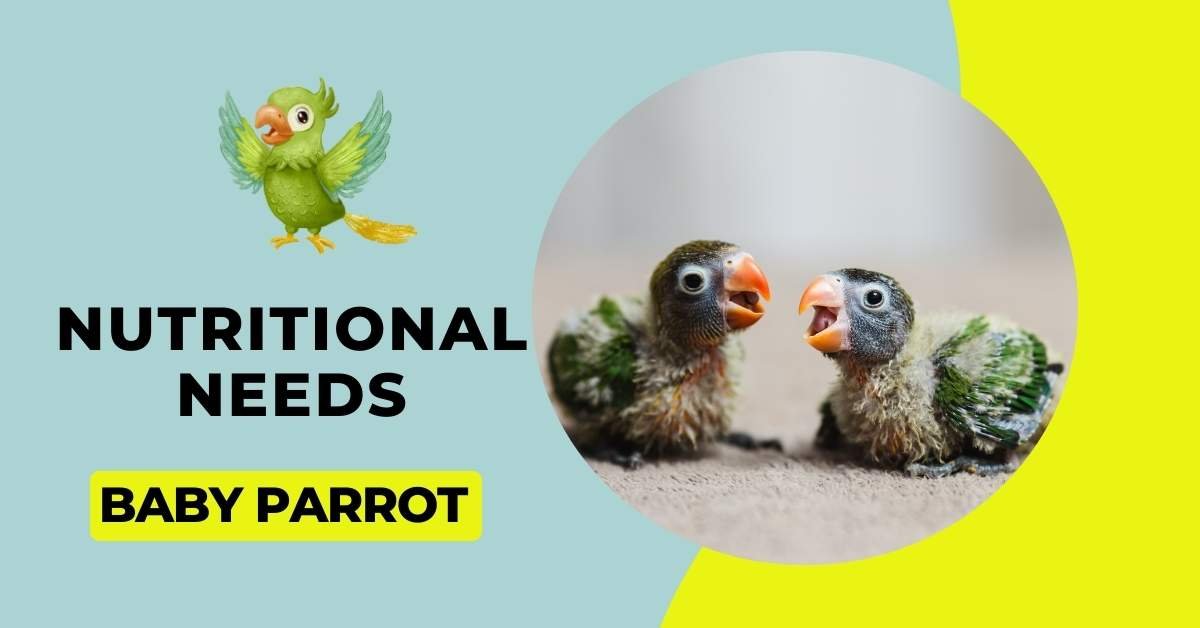Providing proper nutrition is crucial for baby parrots’ healthy growth and development. Just like human babies, baby parrots have specific nutritional needs that must be met to support their overall health and well-being. This guide will help you understand these needs and how to meet them effectively.
Importance of Proper Nutrition for Baby Parrots
One of the critical factors in ensuring the healthy growth and development of baby parrots is providing them with a proper and balanced diet. Without the right nutrients, baby parrots can suffer from developmental and health problems that can affect them throughout their lives.
To ensure your baby parrot thrives, knowing what nutrients they need and how to provide them is essential.
Nutritional Needs Table for Baby Parrots
Essential Nutrients Required for Their Growth and Development
Protein
Protein is a vital building block for developing your baby parrot’s muscles, bones, and feathers. Ensure to include protein sources such as cooked chicken, tofu, or boiled eggs in their diet.
Calcium
Calcium is essential for the development of strong bones and feathers. Provide your baby parrot with calcium-rich foods like calcium-fortified pellets, dark leafy greens, and cuttlebone.
Vitamin A
Vitamin A is crucial for maintaining healthy skin, feathers, and eyesight. Include foods rich in vitamin A, such as carrots, sweet potatoes, and spinach, in their diet.
Vitamin D
Vitamin D is essential for calcium absorption and bone health. Exposure to natural sunlight for a few minutes each day is the best way for your baby parrot to obtain vitamin D. If natural sunlight isn’t an option, consider vitamin D supplements after consulting a veterinarian.
Vitamin E
Vitamin E is essential for adequately functioning your baby parrot’s immune system. Offer them foods like almonds, sunflower seeds, and wheat germ oil to ensure an adequate vitamin E intake.
Iron
Iron is necessary to form healthy red blood cells and overall energy levels. Include iron-rich sources like cooked legumes, quinoa, and dark leafy greens in their diet.
Omega-3 Fatty Acids
Omega-3 fatty acids benefit your baby parrot’s brain development and overall heart health. Offer them foods like flaxseeds, chia seeds, and walnuts to ensure an adequate intake of omega-3 fatty acids.
Tips for Providing a Balanced Diet
To ensure your baby parrot receives a well-balanced diet, consider the following tips:
- Variety is Key: Offer a wide range of foods to cover all essential nutrients.
- Consult a Veterinarian: Regular check-ups with an avian vet can help tailor the diet to your parrot’s needs.
- Avoid Toxic Foods: Certain foods like avocado, chocolate, caffeine, and alcohol are toxic to parrots and should be avoided.
Common Mistakes to Avoid
- Overfeeding Seeds: While seeds are a part of a parrot’s diet, over-reliance on them can lead to nutritional deficiencies.
- Neglecting Fresh Foods: Always include fresh fruits and vegetables to provide essential vitamins and minerals.
- Skipping Regular Weigh-ins: Regularly weighing your parrot can help monitor their health and catch any potential issues early.
Conclusion
Understanding and meeting the nutritional needs of baby parrots is crucial for their growth and development. By providing a varied and balanced diet rich in essential nutrients, you can ensure that your baby parrot grows into a healthy and flourishing adult bird. Always consult a veterinarian specializing in avian care to tailor the diet to your specific parrot’s needs. Proper nutrition is the foundation of a healthy and happy parrot
